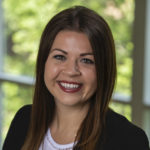By Kara Sherrer
In March, the university shut down and transitioned to a completely virtual format in only a week’s time. Vanderbilt Business used the summer to assess needs and prepare to hold fall classes during an ongoing pandemic, which allowed for a variety of positive changes. From hybrid classes to virtual classes, we dive into what the school has done this fall to keep infection rates low while continuing its mission to teach.
Hybrid Classes
In the spring, professors had a week to move courses completely online. Campus cleared out, students went home, and classes were conducted virtually. This fall, Vanderbilt Business decided to pursue a hybrid model, with some students online and some in person. The vast majority of students opted to come into class in person; in order to maintain social distancing, most classes were split in two, with half the students coming into the classroom on the first day and the other half on the second day.

Richard Willis
All classes adhere to Vanderbilt’s social distancing guidelines, which include face masks for all students, face masks or face shields and a Plexiglass barrier for faculty, no eating or drinking in classrooms, and no paper handouts. These measures have allowed Vanderbilt to keep its positivity rate at 1.70%, compared to a positivity rate of 8.5% for Nashville’s Davidson County and 12% for the entire state of Tennessee (as of November 19).
Vanderbilt Business also made a concentrated effort to match the classroom and its accompanying technology with an instructor’s teaching style. More discussion-based classes are taught in classrooms that facilitate that kind of interaction. “Some of the thinking that we’ve done is trying to assign faculty to specific kind of classrooms based on technology that’s supportive of their particular pedagogy,” said Richard Willis, Senior Associate Dean for the Faculty. “We’re really trying to have face-to-face experiences for all the students wherever possible, and we’re being very diligent about adhering to all the protocols.”

Ishan Gulati
Interactions outside the classroom have also been moved to virtual platforms as well. Drop-in office hours have been moved to Zoom calls, while some professors are answering questions via Microsoft Teams so the whole class can see. “There’s absolutely a difference in being able to just walk up to a professor and talk to them, or setting up specific time to have a Zoom call or a phone call with them. But in terms of the way that they’re handling it, I have found that they have still been extremely open with us, and I don’t think it’s taken away from that professor-student communication experience,” said Ishan Gulati (MBA’21), President of the Owen Student Government Association (OSGA).
Professors have continued to source feedback from students and adjust their processes accordingly through the fall. More incremental changes are also in the works for the spring semester, such as adding an hour-long long lunch break. “We have really tried to partner with the students and evolve practices to the extent practicable as we move forward… Because it is unprecedented, (the situation) has required an openness and an agility with respect to change and modifications,” Willis said.
Recruiting Goes Online

Emily Anderson
Meanwhile, recruiting for internships and jobs had moved into completely virtual formats. All events that would have been conducted in person — including information sessions, coffee chats, career fairs, and interviews — are now being conducted remotely. “We decided right at the beginning of summer recruiting was going to be virtual, because we felt like we could pull it off because we had enough technology,” said Emily Anderson, Senior Director of the Career Management Center.
Not getting those personal, one-on-one interactions with recruiters is a loss for all students, but the virtual format has opened up the amount of companies they can recruit at. Before, it could be difficult to make inroads at certain companies if they didn’t come to recruit on campus, but now the playing field has been leveled. “There’s the downside of not having personal interaction, but there’s the upside of getting broader exposure. Alumni that we would have always loved to have involved in recruiting — we were able to access them a lot easier (through virtual events) because you don’t have to get them to campus,” Anderson explained.
In fact, Anderson thinks that virtual recruiting may continue to play a big role even after the pandemic is over, now that both companies and business schools have proven they have the technology in place. “There’s a lot that’s going to go back (to the traditional way), because people want real interaction, but I think there’s going to be more that’s actually going to stick because of the convenience in the access and exposure,” she predicted.
Socializing During COVID-19
Both students and staff have worked together to create as welcoming an environment as possible and foster connections between new students. The building is staffed during its hours of operation, and the population density is kept within prescribed bounds.

Lindsay Donald
“Staff have been a lot more focused on delivering the student experiences that they’re responsible for. They have also been innovative in how they get in touch with students, how they meet with students, how they have experiences in that co-curricular space with students,” said Lindsay Donald, Chief of Staff. “We wanted to create a welcoming environment to show that personal scale, even if we can’t meet in person… experience is important.”
Meanwhile, student leaders have sought to create meaningful social engagements, through large Zoom gatherings and smaller, socially distanced in-person groups. Activities include a virtual trivia night, a Chopped-style cooking competition at home, and a TikTok video creation challenge. While virtual events may seem easy to host from the outside, they actually require quite a bit of up-front planning.

M’Kenzie Steel
“You don’t want to put throw a Zoom closing bell on every Thursday, (where) it’s just going to be people staring at each other. You really have to put effort into the goal of the call: who’s going to get on, and how long are you going to stay on? And do you have a plan for the whole thing? You can’t just assume people will engage,” said M’Kenzie Steel (MBA’21), Vice President of OSGA.
Students are aiming for quality over quantity when it comes to virtual events, as most of them already spend many hours per week watching classes or attending information sessions via video call. “Because a lot of classes are through Zoom, there is this aspect of Zoom burnout. After an entire week of classes on zoom, do people really want to socialize in a Zoom or virtual setting?” Gulati pointed out. “Understanding what (students are) looking for, I think has been really key for us.”
Looking Ahead
Considering the future, there’s still much uncertainty about when the pandemic could end and when both the economy and daily life will return to normal. Anderson, who has seen b-school recruiting go through 3 recessions in her career, says the economic effects so far have been milder than previous low points. “It’s not devastating to MBA recruiting… it’ll probably be reined in this year, but I don’t think it’s as devastating as 2008-2009, at least right now,” she said.
As for other silver linings, the adoption of virtual platforms has further opened up communication between students, staff, and faculty. For example, OSGA has a weekly call with the Student Programs Office, the Career Management Center, and the Leadership Development Program to address student concerns. “It’s obviously not the best situation that we’re in right now, but I think there can be some (good) things that come out of this. I hope that that line of communication stays open after we go back to being in person and back to normal life,” Steel said.
In the meantime, students, faculty, and staff are doing their best to keep moving forward. “It’s difficult to adjust to this when you come in expecting something and you’re not necessarily getting the experience that you were expecting,” Gulati added. “But in terms of the way that people have been handling the adjustments, both from the student body as well as the faculty and admin, I think everyone has been doing a really great job.”